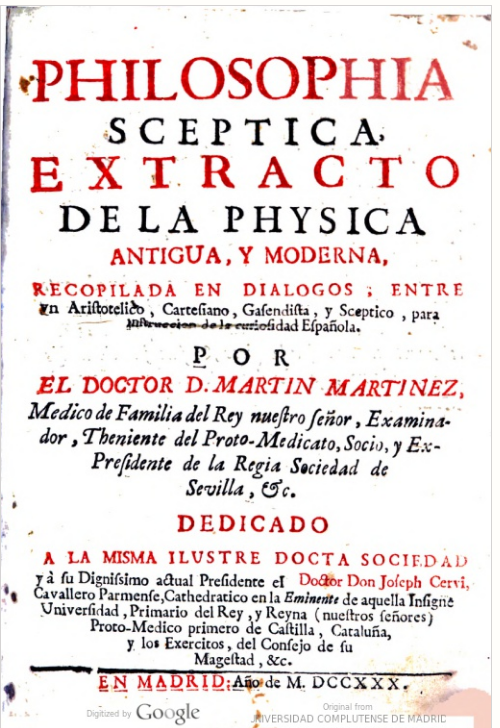
Libraries
Libraries
Skeptical Philosophy, Martín Martínez (1730)
This treaty of Martinez constitutes a valuable source of information of the philosophical debate of the eighteenth century in Spain. The author elaborates this dissertation in a dialogue style, also used by Cardenas (maybe this was an inspiring source for Cárdenas). Nevertheless in the case of Martinez, there are four opposing positions that embody the philosophical thought around the nature and its human interpretation: namely the Aristotelian, the gasendist (from the French philosopher Gassendi), the Cartesian, and the skeptic. The author identifies himself with skeptical thinking, what shelters an interesting background that makes us think why Martínez’ texts were so popular in the dissemination and teaching of Hispanic sciences.
As we mentioned in the previous section, it is more consistent with Cárdenas’ spirit and intentions to find that this has been the text to which he wanted to refer in his enumeration. Martínez is an author that identifies himself with skepticism, questioning the fact that wisdom that does not correlate with experience. He would have given Cárdenas more arguments and assurance to reaffirm himself in the questioning of the established order, in particular, to the other’s refusal to consider his thesis. However Cárdenas’ questions and inquiries extend to other topics throughout his manuscript, which would allow us to trace, beyond a specific element, the influence of Martínez work. Likewise, Martinez book introduces the philosophical debate about the validity of Aristotelian thought, framing it in scholastic philosophy, which is related to the quotation that Cardenas does later, when talking about the Martínez.
The author identifies himself with skeptical thinking, which does not fail to harbor an interesting background as to why his texts were so popular in the dissemination and teaching of Hispanic sciences. As we mentioned in the previous section, it is better consistent with the spirit and intentions of Cárdenas that this has been the text that he wanted to refer to in his enumeration. An author identified as a skeptic, who questions the fact that wisdom that does not correlate with experience, would have given Cardenas more arguments and security to reaffirm himself in his questioning the established order.

